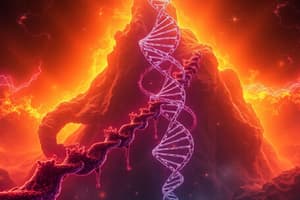Podcast
Questions and Answers
What is directional selection?
What is directional selection?
- A process reducing genetic diversity
- A mode of natural selection favoring extreme phenotypes (correct)
- A linear set of changes in organisms
- The diversification into different ecological niches
What does stabilizing selection do?
What does stabilizing selection do?
- Decreases genetic diversity (correct)
- Increases genetic diversity
- Supports extreme traits
- Allows for rapid evolution
What is disruptive selection?
What is disruptive selection?
A mode of natural selection favoring extreme trait values over intermediate values.
Define uniformitarianism.
Define uniformitarianism.
What is variational evolution?
What is variational evolution?
Describe transformational evolution.
Describe transformational evolution.
What does adaptive radiation refer to?
What does adaptive radiation refer to?
What is homoplasy?
What is homoplasy?
Explain ecological release.
Explain ecological release.
What does 'sessile' mean?
What does 'sessile' mean?
Define punctuated equilibrium.
Define punctuated equilibrium.
What is alcohol dehydrogenase?
What is alcohol dehydrogenase?
Describe the founder effect.
Describe the founder effect.
What is teleology?
What is teleology?
What is gene flow?
What is gene flow?
Define genetic drift.
Define genetic drift.
What is pleiotropy?
What is pleiotropy?
What are hitch-hiking alleles?
What are hitch-hiking alleles?
What is a haplotype?
What is a haplotype?
Flashcards are hidden until you start studying
Study Notes
Natural Selection Types
- Directional Selection: Favours extreme phenotypes, leading to shifts in allele frequencies over time toward that phenotype.
- Stabilizing Selection: Reduces genetic diversity, stabilizing the population mean for a particular trait.
- Disruptive Selection: Favours extreme trait values over intermediate ones, promoting diversity in a population.
Evolutionary Concepts
- Uniformitarianism: Theory that geological changes occur through continuous and uniform processes over time.
- Variational Evolution: Involves continual branching and extinction of species; differs from transformational evolution, which follows a simple, linear path.
- Transformational Evolution: Refers to linear changes in a single lineage, contrasting with the branching nature of variational evolution.
Adaptive Mechanisms
- Adaptive Radiation: Diversification of organisms into different forms to exploit various ecological niches.
- Homoplasy: Shared traits among different species not present in their common ancestor, often due to convergent evolution.
Species Introduction and Ecology
- Ecological Release: Occurs when a species is introduced to a new environment, leading to establishment or extinction.
- Sessile: Describes organisms, such as barnacles, that are fixed in one place and unable to move.
Theories of Evolutionary Change
- Punctuated Equilibrium: Suggests that species experience long periods of stability (stasis) interrupted by brief, significant changes.
Genetic Concepts
- Alcohol Dehydrogenase: Enzyme responsible for breaking down alcohol; absence can lead to addiction.
- Founder Effect: Occurs when a small group lacks a specific gene, resulting in its absence in the larger population.
- Gene Flow: Transfer of alleles between populations, potentially causing notable changes in allele frequencies.
- Genetic Drift: Random changes in gene frequencies, especially significant in small populations due to chance events.
- Pleiotropy: A single gene affecting multiple traits, leading to diverse phenotypic expressions.
- Hitch-hiking Alleles: Alleles that change frequency not due to natural selection but because of proximity to another gene under selection.
- Haplotype: A combination of DNA variations inherited together, indicating the presence of linked alleles or SNPs on the same chromosome.
Studying That Suits You
Use AI to generate personalized quizzes and flashcards to suit your learning preferences.




